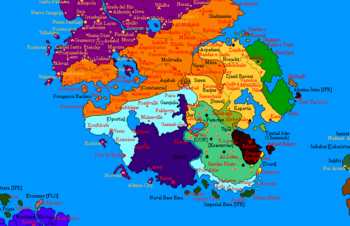Operation Butterworth

|
This article or section is a work in progress. The information below may be incomplete, outdated, or subject to change. |
| Operation Butterworth | |||||||
|---|---|---|---|---|---|---|---|
| Part of the Alexandrium Wars, the Bitter Spring | |||||||
 A map of southern Eura, the affected areas, at the start of Operation Butterworth; 1730 AN. |
|||||||
|
|||||||
| Belligerents | |||||||
| Supported by: | |||||||
| Commanders and leaders | |||||||
| Units involved | |||||||
| |||||||
| Strength | |||||||
| |||||||
Operation Butterworth is the Natopian military intervention in support of Oportia during the Alexandrium Wars and the regional turmoil known as the Bitter Spring. Initiated in IV.1730 AN, this operation was aimed at addressing the escalated military and humanitarian crises facing Oportia, notably underscored by the Naval Battle of Port Baroque and the complications surrounding Operation Secure Haven. In a significant demonstration of Raspur Pact solidarity and to assist Oportia's efforts in both territorial security and refugee crisis management, the Natopian Defense Force deployed 100,000 troops. Half of these forces were allocated to assist the Southeastern Eura Provisional Administration in establishing stability within the region, while the other half bolstered Operation Secure Haven's capabilities in handling the influx of refugees.
A crucial aspect of Operation Butterworth was the Natopian naval support during the Naval Battle of Port Baroque. The Natopian Defense Force's Raynor Fleet, comprising the 2nd Carrier Group, 3rd Home Group, and 1st Submarine Group, executed a timely and decisive counterattack against the Confederacy of the Dispossessed' Navy. This unexpected intervention decisively shifted the battle's outcome in favor of Oportia, dealing a significant blow to the Dispossessed Navy's operational capabilities.
Overview of the deployment
The scale of the Natopian deployment, delivered on a tight schedule, would cause chaos for commercial aviation across three continents, as airlines including AirAlduria, Eurawings, and the Imperial Constancian Airways Corporation, were chartered for the massive airlift of NDF personnel from Apollonia and Tapfer to southern Eura. When critics asked where Natopian strategic air lift capability was during all of this, the Court of the Verdant Garden duly responded that, whilst this was indeed a very good question, the NDF was undergoing a multi decade reorganisation and it was thus naive to expect every capability to be fully funded and available.
Nonetheless, for the benefit of the media and domestic audiences, every effort was made to ensure that contingents of what were to become the Natopian Expeditionary Force did arrive in Oportia in a timely and well publicised manner.
Every Spacefleet and Dingo X shuttle craft available was redirected towards ensuring that the 14,400 men of the Natopian Airmobile Rapid Reaction Force would complete the intercontinental hip across the Raynor Sea in an expedited manner. Two further corps of the Natopian Army would follow, along with their equipment and stores in slower time, via the chartered commercial aviation already alluded to.
The Natopian contingents would be arriving in country without dedicated support vehicles. To remedy this, the 3rd and 4th directorate's of the General Inspectorate of Eura and Corum directed to convoy 25,000 Psilos infantry mobility vehicles towards Port Félix, whilst at the same time, the Grand Commissariat of Eura and Corum was instructed to hire every four and eight ton truck commercially available in Oportia and neighbouring Zeed.
As a consequence, vast quantities of vehicles, materiel, and stores would be moved from arsenals in Petropolis and Aqabah towards Port Félix via the Pan-Euran Highway, and Trans-Euran Railway. Security would accordingly be elevated by Trans-Euran Command along those routes in light of the ongoing difficulties resulting from the Bitter Spring.
Amidst the logistical complexity involved, the Natopian Defense Force relied heavily on the prowess of Kerularios & Company and SATCo, two of the most capable international shipping conglomerates in Natopia. These corporations orchestrated the movement of vast numbers of personnel and equipment across continents with efficiency that belied the haste of the operation. Kerularios & Company, renowned for its fleet of cargo ships and freight handling expertise, mobilized its resources to transport heavy equipment, including armored vehicles and support gear, from Natopian docks directly to the ports of southeastern Eura. SATCo, leveraging its extensive network of cargo planes, submarines, ships, and strategic airlift capabilities, was instrumental in ferrying Natopian airborne units and essential supplies, ensuring that the aerial deployment was synchronized with the maritime logistics.
Units involved
Natopia
- Raynor Fleet
- 2nd Carrier Group
- Naval Air Squadron
- 3rd Home Group
- Requisitioned SATCo shipping
- 2nd Carrier Group
- Natopian Expeditionary Force
- Natopian Airmobile Rapid Reaction Force (designated force security)
- I “Asara” Corps (attached to Operation Secure Haven
- XV Corps (attached to Southeastern Eura Provisional Administration)
- Expeditionary Air Wing
- Operational Support Services Echelon, Directorate of Security (ESB Group)
Nouvelle Alexandrie
- Intelligence support
- Air Force support, logistical support, fuel/resupply support, fixing damage to ships from naval battle - from Norvind and Alduria City.
Trans-Euran Command
Confederacy of the Dispossessed
- Ships and units involved
Azad Eura
- Units involved in southeastern Eura
Timeline
See also
- Operation Secure Haven
- Naval Battle of Port Baroque
- Southeastern Eura Provisional Administration
- Bitter Spring